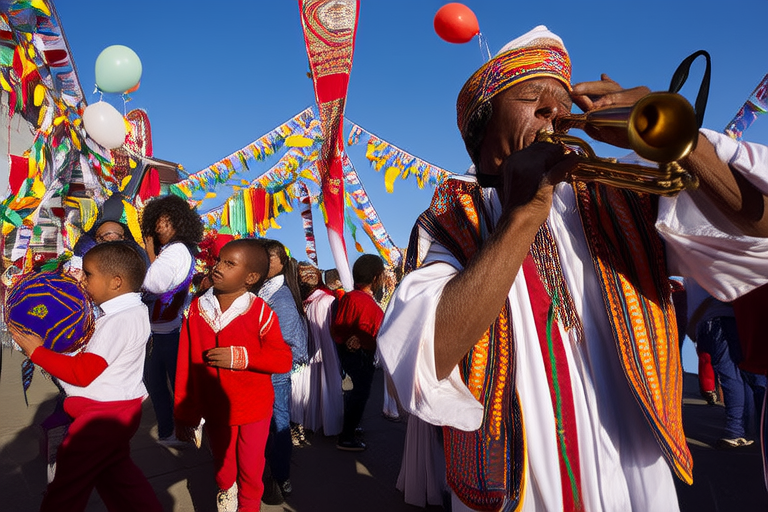Traditional Festivals: A Window into World Cultures

“`html
Traditional Festivals: A Window into World Cultures
Introduction
Traditional festivals are vibrant celebrations that have been passed down through generations, serving as a vital means of preserving cultural heritage. These events are deeply rooted in history, religion, and seasonal cycles, offering a glimpse into the rich tapestry of human diversity. From the bustling streets of Rio de Janeiro during Carnival to the serene lantern-lit paths of Diwali in India, festivals around the world reflect unique cultural identities and practices.
These festivities not only entertain but also educate, bringing communities together and fostering a sense of belonging. By participating in or observing these celebrations, one can gain profound insights into local traditions, customs, and values. This article explores the cultural significance of traditional festivals, their expressions through music, dance, food, and costumes, and the challenges and opportunities they face in an increasingly globalized world.
Cultural Significance of Festivals
Festivals often commemorate historical events, religious beliefs, or seasonal changes, acting as living monuments to the past. For instance, Diwali, the Festival of Lights in India, celebrates the victory of light over darkness and good over evil, symbolizing the triumph of knowledge and righteousness. In contrast, Carnival in Brazil is a vibrant pre-Lenten celebration characterized by elaborate parades, samba dancing, and colorful costumes.
Chinese New Year, one of the most widely celebrated festivals globally, marks the beginning of the lunar calendar and is a time for family reunions, feasting, and the exchange of red envelopes filled with money. These celebrations not only honor the past but also strengthen communal bonds, reinforcing shared values and traditions.
Moreover, festivals play a crucial role in passing on cultural heritage to younger generations. They serve as educational tools, teaching children about their roots and instilling a sense of pride in their cultural identity. Through these events, communities can maintain their unique customs and traditions, ensuring that future generations continue to cherish and celebrate them.
Festivals as Cultural Expressions
The cultural richness of traditional festivals is evident in their multifaceted expressions, including music, dance, food, and costumes. Each element contributes uniquely to the uniqueness of the festival and offers a deeper understanding of the host culture. For example, during Mardi Gras in New Orleans, jazz bands parade through the streets, playing lively tunes that have become synonymous with the event.
In Japan, the cherry blossom festival, or Hanami, features traditional tea ceremonies, where guests enjoy delicate sweets and green tea while admiring the fleeting beauty of the blossoms. Similarly, the Day of the Dead in Mexico showcases elaborate altars adorned with marigolds, candles, and offerings to honor deceased loved ones.
Personal stories and anecdotes further illustrate the impact of festivals on participants and observers. One might recall a grandmother’s recipe for a special dish prepared only during a particular festival or a childhood memory of dressing up in costume for a community parade. These intimate experiences highlight the emotional and social significance of festivals, making them more than just events but cherished moments in people’s lives.
Globalization and Preservation
Globalization has both influenced and preserved traditional festivals. While it has introduced new audiences and increased international awareness, it has also posed challenges such as commercialization and the potential loss of authenticity. For instance, the rise of mass tourism has transformed some festivals into major tourist attractions, sometimes at the expense of their original meaning.
However, many communities have taken proactive steps to preserve traditional practices. Educational programs, cultural workshops, and community-led initiatives ensure that the essence of these festivals remains intact. Tourism, when managed responsibly, can also play a positive role in preserving festivals by providing financial support and raising awareness about their cultural significance.
Efforts to preserve traditional festivals include UNESCO’s recognition of certain events as intangible cultural heritage, which provides international protection and promotes their conservation. Additionally, local governments and non-profit organizations work tirelessly to safeguard these cultural treasures, ensuring that they remain vibrant and relevant for future generations.
Festivals as Tourist Attractions
Many traditional festivals have become significant tourist attractions, drawing visitors from around the world. While this influx of tourists can enhance the visibility and economic viability of these events, it also raises important ethical considerations. It is essential for visitors to approach these festivals with respect and an open mind, recognizing the cultural significance of the practices they observe.
Tourists can engage meaningfully with local cultures by participating in activities, respecting local customs, and supporting local businesses. For instance, during the Oktoberfest in Munich, visitors can learn about German brewing traditions by attending beer tastings and workshops. In Bali, tourists can participate in traditional Balinese dances and ceremonies, gaining insight into the island’s spiritual heritage.
Ethical considerations for tourists include being mindful of the environment, respecting local regulations, and avoiding behaviors that may be considered disrespectful. By doing so, visitors can contribute positively to the preservation and promotion of these cultural treasures.
Conclusion
Traditional festivals are more than just celebrations; they are windows into the diverse cultural practices, beliefs, and histories of people around the world. These events serve as powerful tools for preserving cultural heritage and fostering a sense of community. Whether through the vibrant colors of Carnival or the quiet reflection of the Day of the Dead, festivals offer unique insights into the values and traditions that define different societies.
By participating in or learning about these festivals, we can promote cross-cultural understanding and appreciation. As we continue to navigate an increasingly interconnected world, it is essential to recognize and celebrate the rich tapestry of cultural expressions that make our world so vibrant and diverse. Let us seek out and experience traditional festivals in our own communities or when traveling, embracing the opportunity to connect with and learn from others.
“`